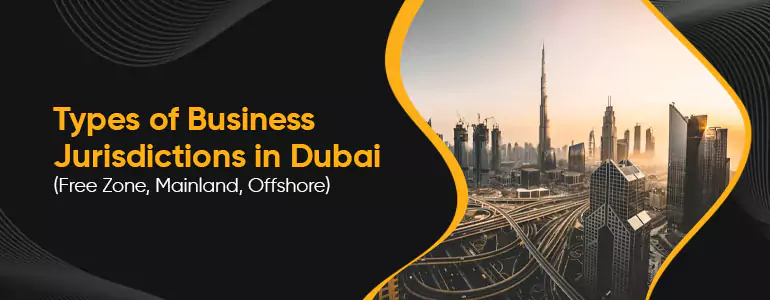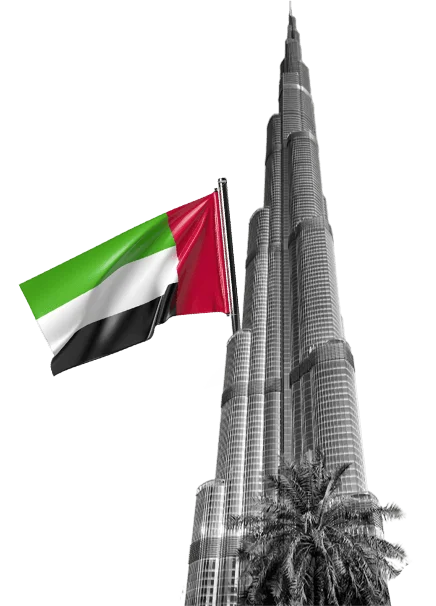Dubai is one of the most attractive business hubs in the world. Thanks to its growing economy, tax-friendly policies, and investor-friendly laws, many entrepreneurs are choosing Dubai for their next venture.
But before you start your business, it’s important to understand the different business structures in Dubai.
There are three main types of Dubai company formation:
Each has its own rules, benefits, and costs.

1. Free Zone Company: Tax-Free Zones Ideal for Global Trade
What Is a Free Zone?
Free Zones are special economic areas in Dubai where businesses can enjoy various incentives. There are over 30 Free Zones in Dubai, including DMCC, DAFZA, and Dubai Silicon Oasis.
Dubai Free Zone Company Advantages
- 100% foreign ownership, no local sponsor needed.
- 0% corporate and income tax (under specific criteria).
- Full repatriation of profits and capital.
- No customs duties on imports/exports within the zone.
- Access to free zone company Dubai visa quotas for investors and staff.
- Easy business setup and licensing process.
Free Zones are ideal for companies that trade internationally or operate online. They also provide high-quality office spaces, warehouses, and support services.
Limitations
- You cannot trade directly in the UAE mainland without a local distributor or opening a mainland branch.
- You must rent office space within the Free Zone.
Free Zone Dual License Update (2025): Operate in Both Zones Legally
Thanks to recent changes in 2025, some Free Zones now allow companies to apply for a dual license. This allows you to operate in both the Free Zone and the Mainland without opening a separate company. This is a game-changer for businesses looking to expand.
Thinking about setting up a business in the Free Zone? Explore our company formation services.
2. Mainland Company: Full UAE Market Access & Government Contracts
What Is a Mainland Company?
A Mainland company is registered with the Dubai Department of Economy and Tourism (DET). It can operate anywhere in the UAE and take on government contracts.
Benefits of Dubai Mainland Company Setup
- Full access to the UAE market.
- 100% foreign ownership in most sectors due to the recent mainland reforms, 100% ownership rule.
- No restriction on the number of visas (depends on office size).
- Eligible for public sector projects and tenders.
Dubai Mainland Licensing, Office & Setup Costs:
A mainland company’s Dubai license depends on your business activity. You must rent physical office space, and costs can be higher compared to Free Zones. However, the market access you gain makes it worth it for many companies.
Mainland Company Limitations in Dubai
- Subject to UAE corporate tax (9%) on profits above AED 375,000.
- More paperwork and regulatory requirements.
Mainland companies are best for those who want to serve the local market or work with the UAE government.
Need help with a Mainland setup? Contact Bestax for expert guidance.
3. Offshore Company: Asset Holding & International Operations
What Is an Offshore Company?
An Offshore company is a legal entity formed for international business purposes. It is not allowed to operate within the UAE, but it can hold assets, open bank accounts, and trade internationally. Common offshore jurisdictions include JAFZA Offshore and RAK ICC.
Benefits of Registering an Offshore Company in Dubai
- 100% foreign ownership.
- Zero corporate and income taxes.
- Privacy and confidentiality, shareholder details are not made public.
- Ideal for holding companies, international trading, or asset protection.
Offshore Company Setup Costs in Dubai (2025)
Offshore companies are cost-effective. They don’t need office space or visas, making them cheaper than Free Zone and Mainland options.
Limitations
- Cannot operate within the UAE.
- No eligibility for UAE residency visas.
- Must comply with Economic Substance Regulations (ESR) for certain activities.
Offshore companies are perfect for entrepreneurs who want to manage global assets or invest in UAE real estate without doing local trade.
Want to set up an offshore company? Check our Offshore Company Setup page.
Free Zone vs Mainland vs Offshore: Key Differences
| Feature | Free Zone | Mainland | Offshore |
|---|---|---|---|
| Ownership | 100% foreign | 100% foreign (most sectors) | 100% foreign |
| Market Access | International only | UAE + international | International only |
| UAE Visa Eligibility | Yes | Yes | No |
| Corporate Tax | 0% (conditions apply) | 9% (above AED 375k) | 0% |
| Setup Cost | Medium | High | Low |
| Physical Office | Required | Required | Not required |
| Ideal For | Exporters, tech firms | Retail, construction, services | Asset holding, investments |
Which Business Structure Should You Choose in Dubai (2025)?
Choosing the best business structure in Dubai 2025 depends on your business goals:
- Want to trade internationally and enjoy tax benefits? Choose Free Zone.
- Want to sell in the UAE or work with the government? Go for a Mainland company
- Want to hold international assets or open a UAE bank account? An Offshore setup is best.
Here’s a 2025 overview of all the main business structures you can consider:
1. Sole Establishment (Sole Proprietorship)
Best For: Freelancers, consultants, and single-owner businesses.
- Ownership: 100% owned by one individual (UAE or GCC national; expats can only do this for professional licenses).
- Liability: Unlimited personal liability.
- Control: Full control by the owner.
- Tax: Subject to UAE corporate tax (if income exceeds AED 375,000).
- Regulations: Relatively simple to register; ideal for low-risk professional services.
Note: Foreigners need a Local Service Agent (LSA), no ownership, only administrative assistance.
2. Civil Company
Best For: Professional services offered by two or more people (e.g., doctors, lawyers, engineers).
- Ownership: Can be 100% foreign-owned.
- Liability: Partners are jointly and severally liable.
- Regulation: Local Service Agent required for foreign partners.
- Industries: Common in consultancy, legal, healthcare, and engineering sectors.
3. Limited Liability Company (LLC)
Best For: SMEs and startups wanting local market access with limited liability.
- Ownership: 100% foreign ownership is now allowed in many sectors (subject to DED approval and negative list).
- Liability: Limited to shareholders’ capital contributions.
- Capital: No minimum capital requirement, but declared capital must be realistic.
- Control: Managed by one or more appointed managers.
- Regulations: Most common structure for mainland business.
4. Free Zone Company (FZC / FZE)
Best For: Foreign investors prioritizing 100% ownership and ease of setup.
- Ownership: 100% foreign ownership allowed.
- Liability: Limited liability.
- Trading Restrictions: Cannot trade directly in the UAE mainland without a local distributor.
- Benefits: Full repatriation of profits, no customs duty inside the zone, and streamlined setup
- Popular Free Zones: DMCC, Dubai South, IFZA, Dubai Internet City, DIFC (for finance), etc.
5. Branch of a Foreign Company
Best For: International companies wanting to expand into Dubai.
- Ownership: Not a separate legal entity; 100% owned by the parent company.
- Liability: Parent company bears full liability.
- Requirements: Must appoint a local service agent (no equity role).
- Activities: Must mirror the parent company’s activities.
6. Representative Office
Best For: Market research and liaison activities without commercial transactions.
- Ownership: 100% foreign-owned; requires a local service agent.
- Liability: No independent liability; tied to the parent company.
- Limitations: Cannot generate revenue or engage in contracts.
7. Public Joint Stock Company (PJSC)
Best For: Large businesses aiming to list on the stock exchange.
- Ownership: Shares publicly traded
- Minimum Capital: AED 30 million.
- Board: Majority of UAE nationals required.
- Regulatory Oversight: Heavily regulated by SCA and the DFM or ADX.
8. Private Joint Stock Company (PrJSC)
Best For: Large private companies raising capital from private investors.
- Liability: Limited to capital contribution.
- Minimum Capital: AED 5 million.
- Shares: Not publicly traded.
- Owners: Between 2 and 200 shareholders.
Switching from Free Zone to Mainland in Dubai: What’s New in 2025?
Yes, you can. In 2025, new rules will allow free zone companies to operate in mainland more easily. You can either:
- Open a mainland branch of your Free Zone company, or
- Apply for a dual license free zone.
This gives you the flexibility to trade locally without losing your Free Zone benefits.
Want to explore your options? Get expert advice from Bestax.
Dubai Business Setup in 2025: Final Takeaway
Here’s a recap:
- Free Zone: Best for global businesses and startups.
- Mainland: Ideal for local trade and government contracts.
- Offshore: Great for asset management, privacy, and international operations.
With recent mainland reforms, 100% ownership, updated Free Zone laws, and tax changes, Dubai continues to evolve as a top destination for business.
Start Your Dubai Business with Bestax Today
Starting a business in Dubai doesn’t have to be complex. At Bestax, we provide:
- End-to-end support for Dubai business structure comparison
- Free consultation on Dubai mainland company setup, Free Zone, or Offshore
- Help with licenses, visas, and tax planning
- Transparent pricing and no hidden fees
Ready to set up your business in Dubai?
Quick FAQs
How to switch from a free zone to a mainland setup?
You can either open a mainland branch of your Free Zone company or apply for a dual license, depending on Free Zone and DET permissions. This allows you to trade in both zones without forming a new entity.
Can offshore companies conduct business in the UAE?
No, offshore companies are not allowed to trade within the UAE market. They can only manage international operations, hold assets, or invest.
What are the visa allowances for a free zone company?
Visa quotas in Free Zones vary by package and office size. Typically, small offices allow 1–6 visas, with options to scale up.
Do I need a physical office for a Dubai mainland license?
Yes, a physical office or shared desk space is mandatory for a mainland business license. The office size also affects your visa quota.
Can a mainland company trade across all the UAE emirates?
Yes, a mainland company can operate freely throughout all seven emirates. It can also participate in government tenders and public sector projects.
How much does it cost to register each company type?
Free Zone setup starts around AED 15,000–25,000, Mainland from AED 20,000–35,000, and Offshore can cost AED 10,000–15,000. Exact costs depend on the business activity, location, and visa needs.
Which structure is best for corporate tax planning?
Free Zone companies (with qualifying income) and Offshore entities offer the best options for tax planning. Mainland companies are subject to 9% corporate tax on profits above AED 375,000.
What are the economic substance rules for offshore entities?
Economic Substance Regulations (ESR) apply to offshore companies involved in specific activities like banking, shipping, or IP. These companies must show real operations in the UAE or face penalties.
Which business structure in Dubai gives 100% foreign ownership?
Free Zone, Mainland (in most sectors under recent reforms), and Offshore companies all allow 100% foreign ownership in Dubai. However, Mainland businesses must ensure their sector is eligible under the current Commercial Companies Law.
Disclaimer: The information provided in this blog is for general informational purposes only. For professional assistance and advice, please contact experts.





